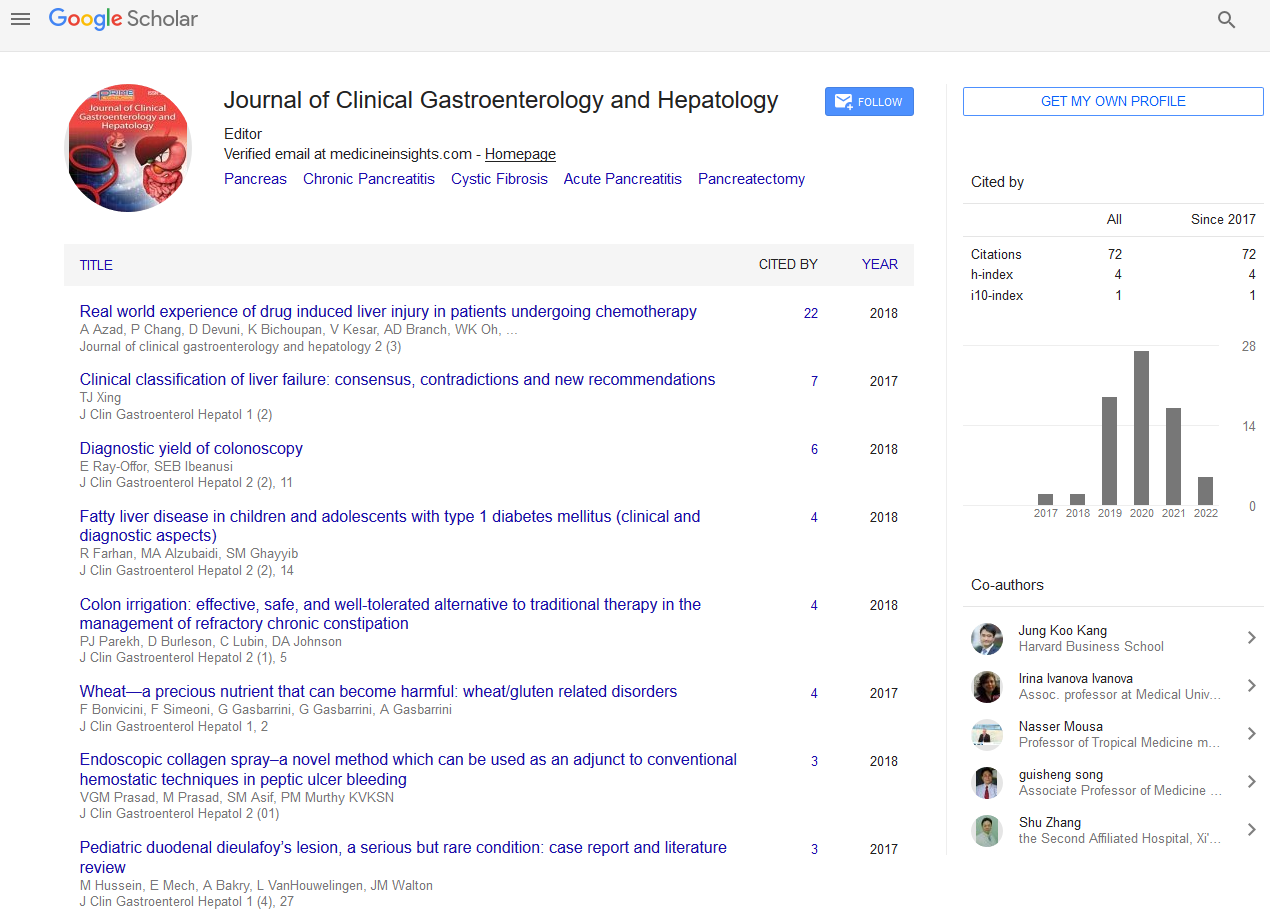Commentary - (2022) Volume 6, Issue 7
The Bacteria Infecting the Digestive System and its Effects on the Stomach
Christoph Lanas*
Department of Gastroenterology, Hospital Universitario de La Princesa, Spain
*Correspondence:
Christoph Lanas, Department of Gastroenterology, Hospital Universitario de La Princesa,
Spain,
Email:
Received: 29-Jun-2022, Manuscript No. IPJCGH-22-14230;
Editor assigned: 01-Jul-2022, Pre QC No. IPJCGH-22-14230 (PQ);
Reviewed: 15-Jul-2022, QC No. IPJCGH-22-14230;
Revised: 20-Jul-2022, Manuscript No. IPJCGH-22-14230 (R);
Published:
27-Jul-2022, DOI: 10.36648/2575-7733.6.7.33
Description
Your stomach becomes contaminated with Helicobacter pylori
tiny organisms, which results in helicobacter pylori (H. pylori)
pollution. Youth is typically when this happens. H. pylori
contamination, a common cause of stomach ulcers (peptic ulcers),
may exist in the majority of people worldwide. Since they
never become sick with H. pylori disease, a large number of
people are unaware that they have it. Your healthcare provider
will probably perform an H. pylori infection test on you if you
develop symptoms and signs of a peptic ulcer. A peptic ulcer is
a sore on the stomach’s lining (also known as a gastric ulcer) or
the first part of the small intestine (duodenal ulcer). Anti-toxins
are used to treat contamination with H. pylori.
A type of tiny bacteria called Helicobacter pylori (H. pylori)
contaminates the stomach. Peptic ulcers are mostly caused by
it, and it can also cause gastritis and stomach cancer. In the
US, about 30%-40% of people become infected with H. pylori.
Most people acquire it as children. Most of the time, H. pylori
has no negative effects. However, it can irritate certain people
and separate the internal protective layer of their stomachs. A
peptic ulcer or gastritis may result from this.
It is unknown to analysts how H. pylori spread. They speculate
that it might be transmitted by sloppy food and water, contact
with contaminated saliva, and other bodily fluids. A peptic ulcer
makes your stomach feel dull or consumingly uncomfortable,
especially if your stomach is empty. It may continue for
several days or weeks and last anywhere from a few minutes to
several hours. Additionally, it could result in a variety of negative
side effects, including as edoema, nausea, and weight loss.
If you have the symptoms of a peptic ulcer, your medical services provider will check to see if you have H. pylori. H. pylori
can be detected through testing on the blood, breath, and faeces.
You may occasionally need an upper endoscopy, typically
together with a biopsy.
Anti-microbials are used by specialists to treat H. pylori illnesses.
Specialists typically recommend a combination of anti-
microbials because a single anti-toxin may not be enough to
eradicate the microscopic organisms. Typically, doctors may
also prescribe stomach settling agents or corrosive suppressing
medications to treat problems brought on by stomach acids.
Many cases of gastritis and peptic ulcer disease caused by H.
pylori, especially duodenal ulcers, can be cured with anti-toxin
therapy. An emergency clinic will treat a child who is experiencing
stomach or small intestine adverse effects.
Anti-toxins can reverse H. pylori illness. Giving their child the
anti-microbial medication as directed for however long the
doctor prescribed is critically important. Follow a routine supper
schedule to help reduce abdominal pain. Plan your dinners
so that your child’s stomach won’t be empty for long periods
of time. It might be best to consume 5 or 6 smaller meals each
day, and your child has to set aside some time to relax after
each meal. Avoid giving your child ibuprofen, ibuprofen-containing
medications, or other pain-relieving treatments. These
could make the stomach hurt or perhaps kill the stomach.
Acknowledgement
None.
Conflict of Interest
Authors declare no conflict of interest.
Citation: Lanas C (2022) The Bacteria Infecting the Digestive System and its Effects on the Stomach. J Clin Gastroenterol Hepatol. 6:33.
Copyright: © Lanas C. This is an open-access article distributed under the terms of the Creative Commons Attribution License, which permits unrestricted use, distribution, and reproduction in any medium, provided the original author and source are credited.

